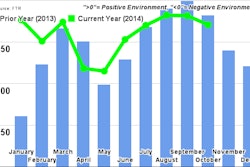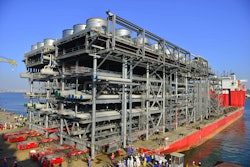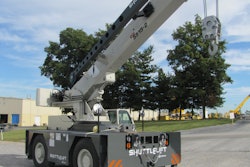The year closed in the red for the Italian domestic agricultural machinery market. Registrations of tractors, combine harvesters, transporters and trailers disclosed a decline more substantial than what was written in forecasts issued at the time of the EIMA International exposition in November. Tractor sales were expected to come to 18,700 units compared to registrations which reached only 18,178 for a 4.4% drop under 2013. In October, registrations had risen to 16,130 units so it appeared feasible for the market to take up on average some 2,600 machines in November and December for a total of 18,700 by the end of the year. As it happened, sales in the last two months came to only 2050 units with the result that the final balance produced the lowest figure in the entire postwar history of mechanization in Italy. In addition to the negative data on tractors came the 26.6% plunge for harvesters, 325 units sold against 443 in 2013, a 3.9% decline for transporters, 908 units moved compared to 945 in 2013, and trailers off by 2.5%, 9,460 sold following 9,704 the previous year.
So the national market crisis, with registrations down 43% over the past 10 years, is showing no sign of improvement. “The persistence of the economic crisis, difficult access to credit and uncertain prospects for the primary sector are discouraging farming enterprises from the acquisition of new machinery and equipment,” says Massimo Goldoni, the President of the Italian Federation of Agricultural Machinery Manufacturers, FederUnacoma. He went on to say, “The few measures which, in combination with an incentive system, could favor the exchange of obsolete machinery which is systematically put off. On 31 December, the government launched the umpteenth postponement of the application of the law on the revision of agricultural machinery, moving the terms for publication of the enabling decree to 30 June 2015, and the start of activities on the control of mechanical means to 31 December 2015.” Concluding his remarks, he affirmed, “The situation is very critical but the country doesn’t look like it’s reacting with the necessary timeliness.”


![Hcm Ax Landcros Press Release[32] jpg](https://img.oemoffhighway.com/mindful/acbm/workspaces/default/uploads/2025/11/hcmaxlandcros-press-release32jpg.mAEgsolr89.jpg?auto=format%2Ccompress&fit=crop&h=100&q=70&w=100)







![Hcm Ax Landcros Press Release[32] jpg](https://img.oemoffhighway.com/mindful/acbm/workspaces/default/uploads/2025/11/hcmaxlandcros-press-release32jpg.mAEgsolr89.jpg?ar=16%3A9&auto=format%2Ccompress&fit=crop&h=135&q=70&w=240)







